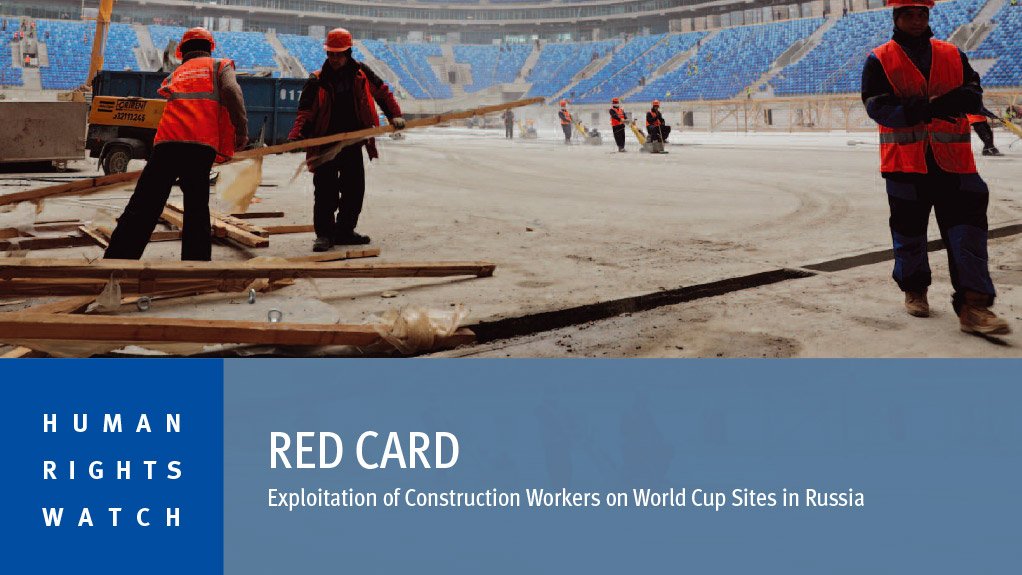- Red Card – Exploitation of Construction Workers on World Cup Sites in Russia3.11 MB
Russia will host the next FIFA World Cup, from June 14 to July 15, 2018, just over four years after hosting the 2014 Winter Olympic Games in Sochi. Mega-sporting events are a source of national pride for the Russian government, and it invests heavily in their success.
Tens of thousands of workers are building the stadiums and infrastructure necessary for hosting of the World Cup. These workers often face exploitation, poor working conditions, and little recourse for abuses. These are long-standing issues that have been well-documented by Human Rights Watch and others before Russia was selected to host the World Cup. Yet the Russian government has not done enough to monitor and curb abusive practices in the construction sector and hold employers accountable.
The world’s top 32 football teams competing in the 2018 World Cup will play matches organized in 12 stadiums in 11 cities in Russia: Moscow (two stadiums), St. Petersburg, Ekaterinburg, Sochi, Kaliningrad, Saransk, Samara, Rostov-on-Don, Volgograd, Kazan, and Nizhnii Novgorod.
To host the World Cup, Russia has built or renovated 10 stadiums and built infrastructure necessary to accommodate the influx of tens of thousands of players, coaches, families, media and others, and hundreds of thousands of fans.
For the first time ever, the Fédération Internationale de Football Association (FIFA), the international governing body of association football, has instituted, together with the Russian officials responsible for the World Cup, a program to monitor labour conditions on World Cup stadium sites. FIFA has told Human Rights Watch that monitors conducted 58 inspections between mid-2016 and June 2017. Additional joint monitoring involving FIFA, Russian officials, and trade unions began in August 2016 and is underway.
However, Human Rights Watch’s investigation suggests that FIFA’s existing labour monitoring system may not be effective. In response to Human Rights Watch’s inquiry, FIFA sent a letter to Human Rights Watch providing details about the methodology, frequency and other technical aspects of its monitoring program. The letter said that during the course of the monitoring there had been reductions in “inconsistencies and incompliances.”
The letter provided two examples in which FIFA said it resolved specific issues revealed by the monitoring process. Beyond these two examples, the letter did not provide any substantive details about the results of the monitoring, such as the specific types of violations, where violations took place, or if or how violations were remedied and the results of those remedial actions, or any other relevant information.
FIFA has not otherwise disclosed or made such information publicly available. In addition, FIFA’s program is limited. It began well after much of the World Cup construction was underway, covers only stadiums and no other World Cup infrastructure, and with respect to methodology, employers are notified in advance of any inspections.
Report by the Human Rights Watch
EMAIL THIS ARTICLE SAVE THIS ARTICLE ARTICLE ENQUIRY
To subscribe email subscriptions@creamermedia.co.za or click here
To advertise email advertising@creamermedia.co.za or click here











